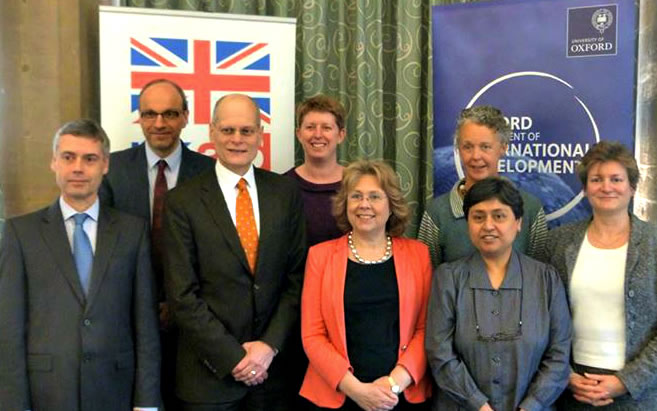A global research project led by the University of Oxford and backed by the British Government will help millions of people in Africa and South Asia to have reliable access to water.
Announced by International Development Minister Baroness Northover, the seven year research project will receive a £15 million grant from the Department for International Development.
A changing and variable climate, increasing demand for water, crumbling infrastructure, unaffordable bills and water contamination have caused a chronic lack of safe, reliable and clean water in the developing world.
Baroness Northover said: ‘Access to water is a defining challenge for the 21st century. The UK has already helped 43 million people to access clean water, but there is far more to be done. Research into how water resources can be better managed will help millions of the world’s poorest and most vulnerable people.
‘Oxford University’s expertise will ensure we can generate new ways to give up to 5 million more people secure water resources in some of the world’s poorest countries.’
The programme’s initial focus will be on fragile states which face great water security risks. Some of the world’s poorest and most vulnerable people live in fragile states, rural hinterlands, floodplains and rapidly growing urban slums where they have very low resilience to water shortages and the least capacity to cope.
The announcement comes ahead of World Water Day on 22 March 2015 and the release of the 2015 United Nations World Water Development Report, which calls for urgent action in managing the earth’s water resources.
The researchers aim to create a risk-based framework for policy-makers, assessing risk at global, national and individual household scales. Researchers will generate data on climate, hydrology, health, poverty and demographic trends to provide an overarching context for governments and international organisations to inform future decision-making to improve water security. Ensuring the research translates into real influence and change leading to improvements for the poorest will be a priority for the programme.
The University of Oxford Vice-Chancellor, Professor Andrew Hamilton, said: ‘This research programme is an outstanding example of how the University of Oxford can contribute to the international effort to improve water security globally. Our researchers work to provide innovative solutions to the pressing challenges of climate change, population growth and sustainable development. They are helping to ensure that more people living in poverty can rely on safe water supplies and working to minimise the impact of droughts and floods on lives and livelihoods.’
The Programme Director Dr Rob Hope, from the Smith School of Enterprise and the Environment in the School of Geography and the Environment, said: ‘Living in poverty has long been synonymous with the struggle for water security. This programme establishes a global science-practitioner partnership to design, test and replicate more effective policy, methods and technologies to improve water security and reduce poverty.’
The global science-practitioner partnership will work with UNICEF global, regional and country programmes to provide the capacity and expertise in delivering water security for children and communities in the greatest need.
Sanjay Wijesekera, UNICEF’s Chief of Water, Sanitation and Hygiene said: ‘Water security will be one of the major challenges in making sure that the poorest and most vulnerable children gain access to drinking water and sanitation. We are excited to be partnering with the University of Oxford to help countries access the best possible evidence for making decisions that will improve the lives of millions of people.’
Media coverage
Oxford and UK Govt to lead research to improve global water supply, University of Oxford, 20/03/15.
Oxford researchers to get £15m to help millions of people access clean water, Oxford Mail, 20/03/15.
Interview with the international development minister, Baroness Northover, about a £15million grant from DFID which has been awarded to Oxford University for a global research project to help millions of people in Africa and South Asia (from 1:24 mins), BBC Radio Oxford, 20/03/15.
Dr Katrina Charles interviewed as part of a review of the week with the latest news (From 31:02 mins), BBC World Service, 22/03/15.

